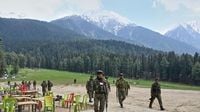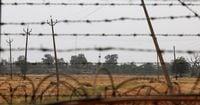Tensions between India and Pakistan have escalated dramatically in recent days, following a series of violent incidents that have reignited longstanding hostilities between the two nuclear-armed neighbors. On April 30, 2025, the Pakistani military violated a ceasefire agreement by opening fire along the international border in Jammu district, a move described by security sources as unusual and significant. This incident occurred near Baraa Jowal, a sensitive area south of the Line of Control (LoC) in Jammu and Kashmir, and marks a departure from previous ceasefire violations that were typically confined to the LoC.
Earlier in the day, the Indian Army reported that its positions in the Nowshera, Sundarbani, and Akhnoor sectors were also targeted, prompting a response characterized by military officials as "prompt and proportionate." This escalation comes on the heels of a deadly terror attack on April 22, which killed 26 people, mainly Indian tourists, in the resort town of Pahalgam, further fueling tensions between the two countries.
In light of the recent violence, diplomatic relations between India and Pakistan have deteriorated sharply. Authorities on both sides have canceled visas and suspended operations at the Wagah border crossing. Indian officials have accused Pakistan of supporting cross-border militancy, a claim that Islamabad denies. The fragile peace established by the 2003 ceasefire agreement, reaffirmed in 2021, is now under serious threat, with communities near the Line of Control expressing anxiety reminiscent of the intense conflicts of the 1990s and 2000s.
On the economic front, Pakistan's dollar bonds and equities are experiencing their poorest monthly performance since 2023, with declines of nearly 4% and almost 3%, respectively. This downturn is largely attributed to the rising tensions with India, which have affected investor confidence. In contrast, Indian assets remain relatively unaffected, with both stocks and domestic bonds showing positive returns this month, according to a Bloomberg report.
Pakistan's Information Minister, Attaullah Tarar, claimed on April 30 that India would initiate military operations within 24 to 36 hours, stating that Pakistan would respond "assuredly and decisively." This assertion follows the terror attack in Jammu and Kashmir that has intensified fears of military escalation. Tarar's comments came as both the United States and China urged restraint, emphasizing the need to avoid confrontation.
In a separate incident, Pakistan reported that it has "credible intelligence" indicating that India plans to attack within days, using the Pahalgam incident as a pretext. This claim has not been commented on by Indian officials. However, Indian Prime Minister Narendra Modi has reportedly given complete operational freedom to the armed forces to determine the mode, targets, and timing of India's response to the attack.
As tensions mount, the United Nations Secretary-General Antonio Guterres has reached out to both nations, stressing the importance of avoiding a confrontation that could lead to tragic consequences. The U.S. State Department has also called for de-escalation, with Secretary of State Marco Rubio expected to speak with Indian and Pakistani foreign ministers soon.
In the wake of the Pahalgam attack, both countries have taken significant diplomatic measures against each other. India has suspended the Indus Waters Treaty, a crucial water-sharing agreement, while Pakistan has closed its airspace to Indian airlines. Additionally, cross-border exchanges of gunfire between Indian and Pakistani soldiers have increased, with reports of small-arms fire along the disputed border for six consecutive nights.
On April 30, Pakistan's military opened fire in the Pargawal sector of Jammu and Kashmir, a move that is particularly provocative given the current climate. Defense sources indicate that India responded effectively to this violation. The attack in Pahalgam, which targeted tourists and civilians, has sparked outrage across India, prompting the government to take a hardline stance against Pakistan, which is often accused of harboring terrorist activities.
Prime Minister Modi expressed the collective grief and anger felt across the nation, stating that the attack was not just on innocent tourists but an attack on India's soul. He vowed that those responsible for the attack would face severe consequences, asserting that it is time to dismantle the terror networks that threaten India's security.
As families affected by the escalating conflict scramble to cross borders, many Pakistani nationals have been ordered to leave India, with exceptions made for those holding medical visas. Sara Khan, a Pakistani national, recounted her distress at being forced to return to Pakistan without her Indian husband, highlighting the personal toll of the political turmoil.
The situation remains fluid, with both India and Pakistan flexing their military capabilities. Reports indicate that India has conducted test missile strikes to demonstrate readiness for long-range precision offensive strikes, while Pakistan has shot down an Indian drone allegedly used for espionage in the disputed region.
As the international community watches closely, the potential for further military action looms large. The history of conflict between India and Pakistan, particularly over the Kashmir region, underscores the volatility of the situation. With both nations on high alert, the prospect of a military confrontation raises serious concerns about regional stability and security.
In summary, the recent escalation of tensions between India and Pakistan following the Pahalgam terror attack has led to a significant deterioration in diplomatic relations, with both countries taking aggressive measures against each other. As military actions and retaliatory threats continue, the international community calls for restraint and dialogue to prevent a further escalation of violence in the region.






